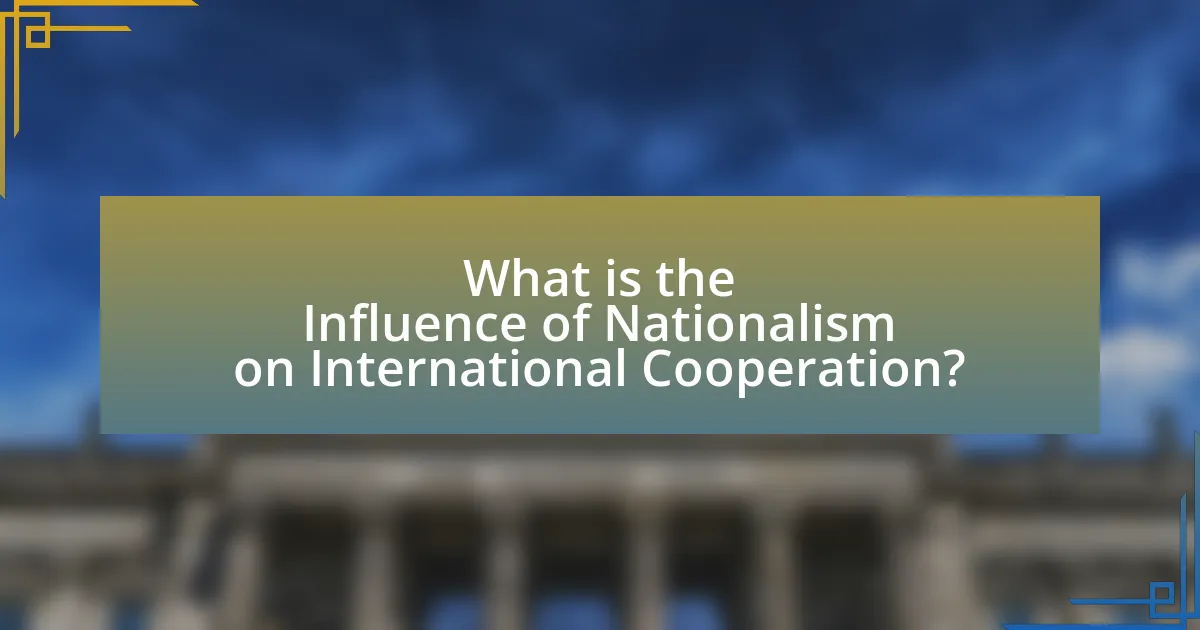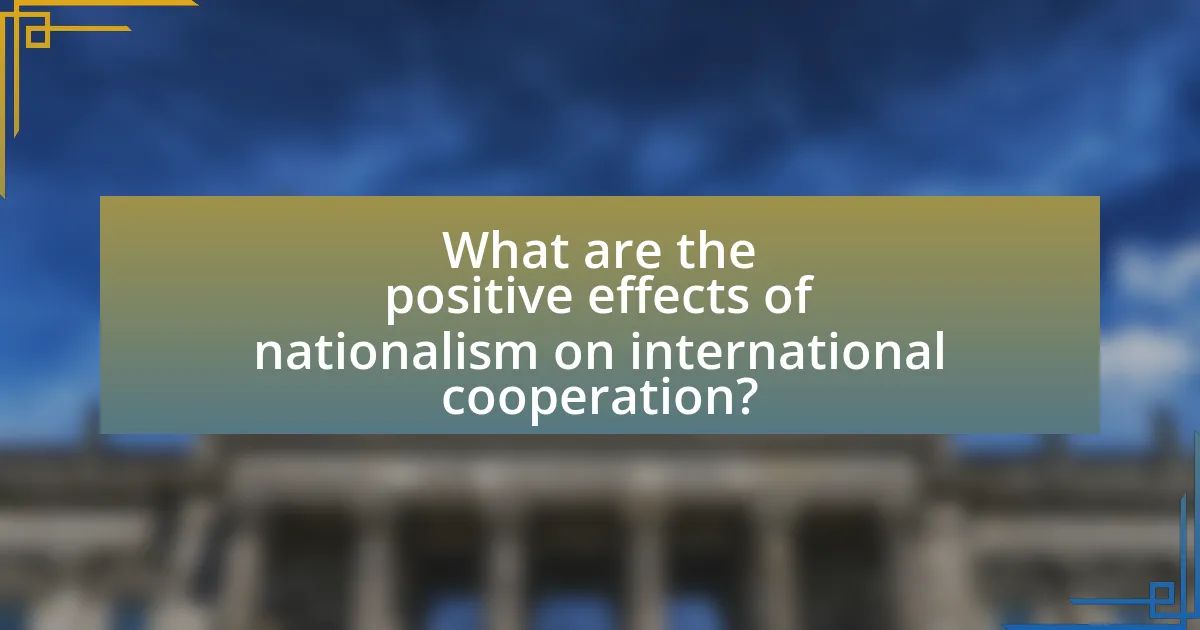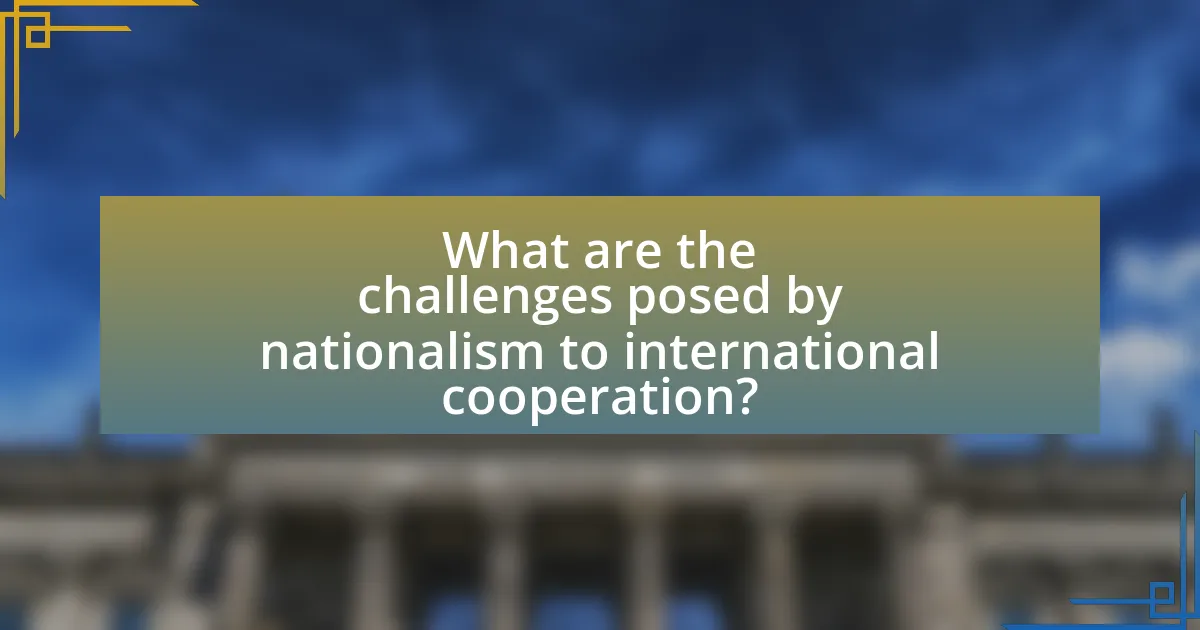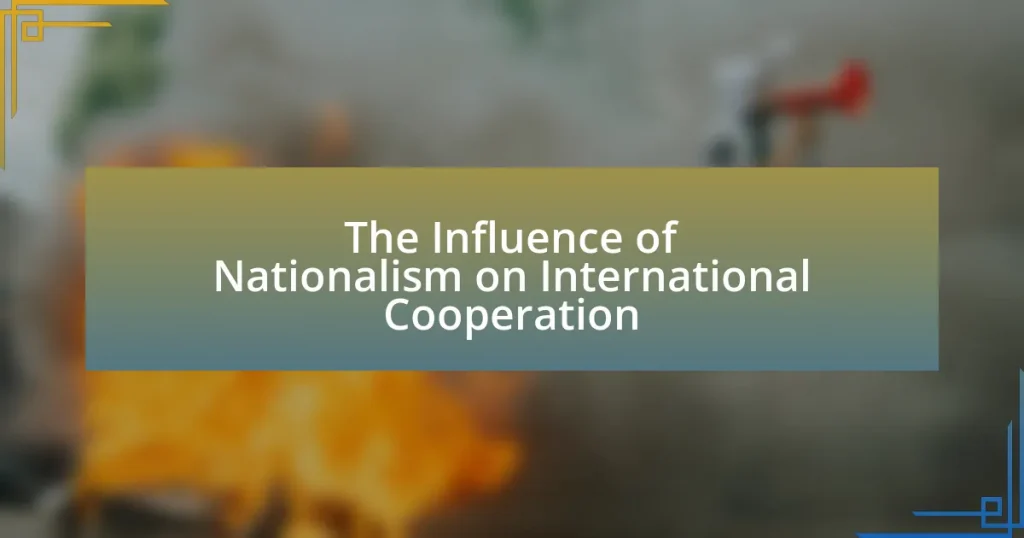The article examines the influence of nationalism on international cooperation, highlighting how national interests often take precedence over collective global goals. It discusses the reluctance of nations to engage in multilateral agreements, illustrated by examples such as the United States’ withdrawal from the Paris Agreement and the rise of protectionist policies. Key characteristics of nationalism, including a focus on sovereignty and cultural identity, are analyzed for their impact on state behavior and diplomatic relations. The article also explores both the challenges posed by nationalism to global cooperation and the potential for nationalism to foster unity in specific contexts, ultimately emphasizing the importance of understanding nationalism for effective international collaboration.

What is the Influence of Nationalism on International Cooperation?
Nationalism significantly influences international cooperation by prioritizing national interests over collective global goals. This prioritization often leads to a reluctance among nations to engage in multilateral agreements, as seen in the rise of protectionist policies and withdrawal from international treaties, such as the United States’ exit from the Paris Agreement in 2017. Nationalist sentiments can create barriers to collaboration on global issues like climate change, trade, and security, as countries may focus on domestic agendas rather than cooperative solutions. Historical examples, such as the rise of nationalist movements in Europe prior to World War I, demonstrate how nationalism can lead to conflict and hinder diplomatic relations, ultimately affecting the ability of nations to work together effectively on shared challenges.
How does nationalism shape the behavior of states in international relations?
Nationalism significantly shapes the behavior of states in international relations by prioritizing national interests and identity over global cooperation. This prioritization often leads to policies that emphasize sovereignty, territorial integrity, and cultural uniqueness, which can result in increased tensions between nations. For instance, the rise of nationalist movements in various countries has led to protectionist trade policies, as seen in the United States under the Trump administration, where tariffs were imposed to protect domestic industries. Additionally, nationalism can fuel conflicts, as evidenced by the Balkan Wars in the 1990s, where ethnic nationalism contributed to the disintegration of Yugoslavia and subsequent violent confrontations. Thus, nationalism influences state behavior by fostering a focus on self-interest and identity, often at the expense of collaborative international efforts.
What are the key characteristics of nationalism that impact international cooperation?
The key characteristics of nationalism that impact international cooperation include a strong emphasis on national sovereignty, cultural identity, and territorial integrity. National sovereignty often leads to prioritizing national interests over global collaboration, as seen in the rise of protectionist policies that hinder trade agreements. Cultural identity fosters a sense of unity within a nation but can create divisions with other countries, complicating diplomatic relations. Territorial integrity drives nations to resist external influence, which can obstruct multilateral efforts to address global challenges, such as climate change or security threats. Historical examples include Brexit, where the desire for national sovereignty led to the UK’s withdrawal from the European Union, significantly affecting regional cooperation.
How does nationalism influence state sovereignty in global governance?
Nationalism influences state sovereignty in global governance by prioritizing national interests over international cooperation. This prioritization often leads to resistance against supranational entities and agreements, as states may perceive these as threats to their autonomy. For instance, the rise of nationalist movements in various countries has resulted in decisions like Brexit, where the United Kingdom opted to leave the European Union, emphasizing sovereignty over collective governance. Such actions demonstrate how nationalism can undermine collaborative efforts in global governance, as states may withdraw from international treaties or organizations that they believe compromise their sovereignty.
Why is understanding nationalism important for international cooperation?
Understanding nationalism is important for international cooperation because it shapes the identities, interests, and policies of nations, influencing their willingness to collaborate on global issues. Nationalism can drive countries to prioritize their own interests, which may lead to conflicts or hinder collective action on challenges such as climate change, trade, and security. For instance, during the Paris Agreement negotiations, nationalistic sentiments affected countries’ commitments to emissions reductions, as leaders sought to align policies with domestic priorities. Recognizing these dynamics allows international organizations and states to navigate and mitigate the potential divisive effects of nationalism, fostering more effective cooperation.
What historical examples illustrate the impact of nationalism on international agreements?
Nationalism has significantly influenced international agreements throughout history, with notable examples including the Treaty of Versailles in 1919 and the formation of the League of Nations. The Treaty of Versailles, which ended World War I, was heavily shaped by nationalist sentiments, particularly from France and Britain, leading to punitive measures against Germany that aimed to satisfy national grievances. This treaty’s harsh terms were driven by a desire for national security and retribution, ultimately contributing to the rise of nationalism in Germany and the onset of World War II.
Another example is the establishment of the League of Nations, which was intended to promote international cooperation but was undermined by nationalist interests, as many countries prioritized their national agendas over collective security. The failure of the League to prevent aggression from nationalist regimes in the 1930s illustrates how nationalism can obstruct international cooperation and agreements. These historical instances demonstrate that nationalism can both shape and destabilize international agreements, often leading to conflict rather than collaboration.
How does nationalism affect diplomatic relations between countries?
Nationalism significantly affects diplomatic relations between countries by fostering a sense of identity and prioritizing national interests, which can lead to tensions or conflicts. When a country emphasizes its national sovereignty and cultural identity, it may resist external influences or interventions, resulting in strained relations with nations that advocate for global cooperation or interventionist policies. For example, the rise of nationalist movements in the United Kingdom during Brexit negotiations illustrated how nationalistic sentiments can complicate diplomatic discussions, as the UK sought to reclaim control over its laws and borders, often at odds with the European Union’s collective interests. This dynamic shows that nationalism can create barriers to collaboration and compromise, ultimately shaping the landscape of international diplomacy.

What are the positive effects of nationalism on international cooperation?
Nationalism can positively influence international cooperation by fostering a sense of unity and shared purpose among nations. This collective identity often leads to collaborative efforts in addressing global challenges, such as climate change and public health crises. For example, the Paris Agreement on climate change saw nations rallying together, driven by national interests to protect their environments while also contributing to a global cause. Additionally, nationalism can enhance diplomatic relations, as countries with strong national identities may be more inclined to engage in multilateral agreements that reflect their values and priorities, thereby promoting stability and peace. Historical instances, such as the formation of the European Union, illustrate how nationalist sentiments can lead to cooperative frameworks that benefit multiple nations economically and politically.
How can nationalism foster unity among nations in specific contexts?
Nationalism can foster unity among nations in specific contexts by promoting shared cultural identities and common goals that transcend national borders. For instance, during the decolonization period in the mid-20th century, nationalist movements in Africa and Asia often united diverse ethnic groups under a common struggle for independence from colonial powers, leading to the formation of regional organizations like the Organization of African Unity (OAU) in 1963. This organization aimed to enhance solidarity among African nations, demonstrating how nationalism can create a collective identity that encourages cooperation for mutual interests, such as economic development and political stability.
What role does nationalism play in promoting regional cooperation?
Nationalism plays a significant role in promoting regional cooperation by fostering a sense of shared identity and purpose among nations. This shared identity can lead to collaborative efforts in addressing common challenges, such as economic development, security, and cultural exchange. For instance, the European Union’s formation was partly driven by nationalist sentiments that emphasized the importance of regional unity to prevent conflicts and promote prosperity after World War II. Additionally, nationalism can encourage countries to work together on issues like environmental protection and trade agreements, as seen in the Association of Southeast Asian Nations (ASEAN), where member states prioritize regional stability and economic growth while respecting national sovereignty.
How does a shared national identity enhance collaborative efforts in international organizations?
A shared national identity enhances collaborative efforts in international organizations by fostering trust and mutual understanding among member states. When countries identify with a common national narrative, they are more likely to engage in cooperative behavior, as seen in organizations like the European Union, where shared cultural and historical ties have facilitated policy alignment and collective action. Research indicates that nations with a strong sense of shared identity are more inclined to collaborate on issues such as trade, security, and environmental policies, leading to more effective multilateral agreements. For instance, the success of the African Union in addressing regional conflicts can be attributed to a shared sense of African identity, which encourages member states to work together towards common goals.
In what ways can nationalism contribute to global challenges?
Nationalism can contribute to global challenges by fostering isolationism, which undermines international cooperation. When countries prioritize national interests over global collaboration, they may withdraw from international agreements, as seen with the United States’ exit from the Paris Agreement in 2017, which hindered collective efforts to combat climate change. Additionally, nationalism can exacerbate conflicts, as it often promotes xenophobia and ethnic tensions, leading to humanitarian crises, such as the Rohingya crisis in Myanmar, where nationalist sentiments fueled violence against minority groups. Furthermore, economic nationalism can disrupt global trade, as protectionist policies, like tariffs, can lead to trade wars, negatively impacting global economies, exemplified by the U.S.-China trade tensions that have affected markets worldwide.
How does nationalism complicate responses to global issues like climate change?
Nationalism complicates responses to global issues like climate change by prioritizing national interests over collective action. This focus on sovereignty often leads countries to resist international agreements that require shared commitments, such as the Paris Agreement, which aims to limit global warming. For instance, nations may withdraw from such agreements or fail to meet their targets due to domestic political pressures, as seen with the United States’ withdrawal in 2017 under a nationalist agenda. Consequently, this undermines global cooperation necessary for effective climate action, as countries become more concerned with their immediate economic and political goals rather than the long-term benefits of collaborative environmental strategies.
What are the implications of nationalist policies on international trade agreements?
Nationalist policies significantly impact international trade agreements by prioritizing domestic interests over global cooperation. These policies often lead to protectionist measures, such as tariffs and quotas, which can disrupt established trade relationships and reduce overall trade volumes. For instance, the United States’ imposition of tariffs on steel and aluminum in 2018 under nationalist rhetoric resulted in retaliatory tariffs from other countries, illustrating how such policies can escalate trade tensions and hinder multilateral agreements. Additionally, nationalist policies can create barriers to foreign investment, as countries may favor local businesses, further complicating international trade dynamics.

What are the challenges posed by nationalism to international cooperation?
Nationalism poses significant challenges to international cooperation by prioritizing national interests over global collaboration. This often leads to protectionist policies, as countries may impose tariffs and trade barriers to safeguard domestic industries, undermining international trade agreements. For instance, the rise of nationalist sentiments in various countries has resulted in the withdrawal from multilateral agreements, such as the United States’ exit from the Trans-Pacific Partnership in 2017, which disrupted economic cooperation in the Asia-Pacific region. Additionally, nationalism can exacerbate tensions between nations, as seen in the European Union’s struggles with member states resisting collective policies on immigration and climate change, ultimately hindering effective global responses to these pressing issues.
How does nationalism lead to conflicts between nations?
Nationalism leads to conflicts between nations by fostering a strong sense of identity and superiority among a nation’s people, which can result in aggressive policies towards other nations. This heightened sense of national pride often manifests in territorial disputes, as seen in the historical context of the Balkan Wars, where nationalist sentiments contributed to violent conflicts over land and sovereignty. Additionally, nationalism can incite competition for resources and influence, exemplified by the rivalry between Germany and France in the early 20th century, which was fueled by nationalistic fervor and ultimately contributed to the outbreak of World War I. Such conflicts arise when nations prioritize their interests and identities over diplomatic solutions, leading to tensions and hostilities on the international stage.
What are the consequences of nationalist movements on international peacekeeping efforts?
Nationalist movements often undermine international peacekeeping efforts by fostering divisions and escalating conflicts within and between states. These movements can lead to increased tensions, as groups prioritize national identity over collective security, resulting in resistance to foreign intervention. For instance, the rise of nationalist sentiments in the Balkans during the 1990s contributed to violent conflicts that complicated the deployment and effectiveness of peacekeeping missions by the United Nations. Additionally, nationalist rhetoric can delegitimize international organizations, as seen in cases where governments reject peacekeeping mandates perceived as infringing on sovereignty. This resistance can hinder the ability of peacekeepers to operate effectively, ultimately jeopardizing the stability and security that such missions aim to achieve.
How does nationalism affect the willingness of states to engage in multilateral negotiations?
Nationalism often reduces the willingness of states to engage in multilateral negotiations by prioritizing national interests over collective goals. When states emphasize national identity and sovereignty, they may perceive multilateral agreements as threats to their autonomy, leading to reluctance in compromising or collaborating with other nations. For instance, the rise of nationalist movements in various countries has been linked to a decline in participation in international treaties, as seen in the withdrawal of the United States from the Paris Agreement under a nationalist agenda that favored domestic over global concerns. This trend illustrates how nationalism can create barriers to effective international cooperation, as states become more focused on unilateral actions rather than collaborative solutions.
What strategies can mitigate the negative impacts of nationalism on international cooperation?
To mitigate the negative impacts of nationalism on international cooperation, fostering inclusive dialogue and multilateral engagement is essential. Inclusive dialogue encourages diverse perspectives, allowing nations to address grievances and find common ground, which can reduce tensions fueled by nationalism. Multilateral engagement, through international organizations like the United Nations, facilitates collaboration on global issues, reinforcing the idea that collective action is beneficial for all parties involved. Historical examples, such as the European Union’s formation post-World War II, demonstrate how cooperative frameworks can diminish nationalist sentiments by promoting economic interdependence and shared governance.
How can international organizations promote inclusive nationalism?
International organizations can promote inclusive nationalism by fostering dialogue and collaboration among diverse cultural and ethnic groups within nations. They can implement programs that encourage participation in governance, ensuring that marginalized communities have a voice in decision-making processes. For instance, the United Nations has initiatives aimed at promoting social cohesion and integration, such as the UN’s 2030 Agenda for Sustainable Development, which emphasizes inclusivity and equality. These efforts are supported by research indicating that inclusive policies can enhance social stability and economic growth, as seen in countries that have successfully integrated minority groups into national narratives.
What role do education and cultural exchange play in reducing nationalist tensions?
Education and cultural exchange play a crucial role in reducing nationalist tensions by fostering understanding and empathy among diverse groups. Educational programs that emphasize multiculturalism and global citizenship encourage individuals to appreciate different perspectives, which can mitigate prejudices and stereotypes often associated with nationalism. For instance, studies have shown that students who participate in international exchange programs report increased tolerance and reduced xenophobia. Additionally, cultural exchanges, such as art exhibitions or collaborative projects, create opportunities for dialogue and shared experiences, further bridging divides. Research from the Institute for Cultural Diplomacy indicates that such interactions can lead to improved relations and decreased hostility between nations, demonstrating the effectiveness of education and cultural exchange in promoting peace and cooperation.
What practical steps can nations take to balance nationalism and international cooperation?
Nations can balance nationalism and international cooperation by promoting inclusive policies that respect national identity while engaging in multilateral agreements. For instance, countries can implement educational programs that emphasize global citizenship alongside national history, fostering a sense of belonging to both the nation and the international community. Additionally, nations can participate in international organizations, such as the United Nations, to address global challenges like climate change, which require collective action while allowing for the expression of national interests. Evidence of this approach can be seen in the European Union, where member states maintain their national identities while benefiting from shared policies and economic cooperation, demonstrating that it is possible to harmonize national pride with collaborative efforts on a global scale.















